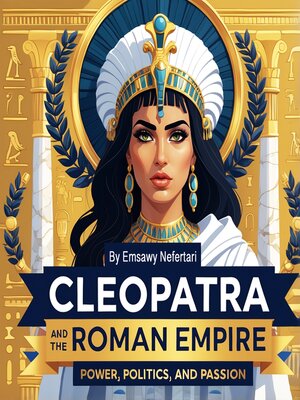Cleopatra and the Roman Empire
audiobook (Unabridged) ∣ Power, Politics, and Passion
By Emsawy Nefertari

Sign up to save your library
With an OverDrive account, you can save your favorite libraries for at-a-glance information about availability. Find out more about OverDrive accounts.
Find this title in Libby, the library reading app by OverDrive.



Search for a digital library with this title
Title found at these libraries:
| Library Name | Distance |
|---|---|
| Loading... |
This audiobook is narrated by a digital voice.
In the sweltering heat of Alexandria, where the Mediterranean breeze carried both the scent of papyrus and the weight of empire, Cleopatra VII Philopator ascended to a throne that had been held by her family for nearly three centuries. The year was 51 BCE, and the eighteen-year-old princess found herself thrust into a world where survival meant mastering not only the ancient arts of Egyptian kingship but also the brutal realities of Roman politics that increasingly dominated the Mediterranean world.
Born into the Ptolemaic dynasty, Cleopatra was the product of a bloodline that traced its origins back to one of Alexander the Great's most trusted generals, Ptolemy I Soter. For nearly three hundred years, the Ptolemies had ruled Egypt as pharaohs, maintaining the fiction of divine kingship while adapting to the practical necessities of governing one of the ancient world's most prosperous and strategically important territories. By the time of Cleopatra's birth, however, this once-mighty dynasty had been reduced to little more than a client kingdom of Rome, dependent on Roman goodwill for its very existence.
The Egypt that Cleopatra inherited was a shadow of its former glory. The great pyramids still stood as monuments to an ancient greatness, and the city of Alexandria remained one of the world's premier centers of learning and commerce, but the political reality was far different from the propaganda of divine rule. Rome's influence permeated every aspect of Egyptian governance, from military decisions to economic policy. The pharaoh's palace might still gleam with gold and lapis lazuli, but the real power increasingly lay in the hands of Roman moneylenders, merchants, and generals who saw Egypt primarily as a source of grain to feed Rome's hungry masses.







